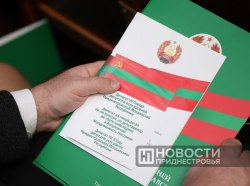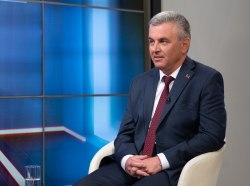The Pridnestrovian delegation in the Joint Control Commission issued a formal statement, the text of the document reads in full:
"The Moldovan delegation, in its statements, provides unjustified, distorted assessments of actions by Pridnestrovie aimed at simplifying the regime of crossing the already existing third decade checkpoints between the parties to the conflict and, consequently, simplifying communication between people from Pridnestrovie and the Republic of Moldova.
Both statements are filled with contrived theses about a certain “unilateral militarization of the Security Zone”. In this context, we remind that the officers at the border posts of Pridnestrovie are not armed, that is, there is no militarization of the Pridnestrovian segment in the Security Zone.
In the meantime, the unauthorized entry of RM battalion of the PPS police in Varnitsa is a concrete example of the unilateral militarization of the Area with an enhanced security regime. We are talking about more than 150 armed with regular weapons and well-equipped police officers who appeared in the Security Zone without notifying the JCC. Tellingly, the unarmed Pridnestrovian border guards at the posts are several times smaller than the police of the PPS of the Republic of Moldova. Regular entry of armed carabineers and police into the Vadul-lui-Voda region is also viewed by Pridnestrovie as militarization.
In addition, members of the Moldovan delegation claim that Pridnestrovie has set up new “border checkpoints” in the Security Zone, which are not reflected in the information previously submitted to the JCC. However, in fact, the items did not become more quantitatively, and the change in their names is associated with a reduction in the departmental presence of the staff involved in the service, and a decrease in their number. The Moldovan side would have been able to verify this if it had refrained from blocking the exit of military observers under the current Instruction of military observers, including at the “Slobodzeya-Kopanka” checkpoint, which operates in the temporary mobile patrol mode.
From the point of view of the Moldovan colleagues, the control of the posts proposed by the Pridnestrovian side by military observers in the framework of the current format of the peacekeeping operation is an attempt by some “legalization” of qualitatively changed posts by Pridnestrovie. We draw attention to the fact that these objects, which have been functioning for many years, are not new and do not need legalization. They were always monitored by JMC in the manner prescribed by the Military Observers Manual. Based on the 1992 Agreement, posting or removing posts in the Security Zone is not the competence of a peacekeeping operation. The Moldovan delegation in the JCC completely ignores this, trying to impose a usurpation of the powers of the negotiation process as opposed to the basic document.
As to the plans for imposing sanctions against representatives of Pridnestrovie and the possible restriction of traffic through the Bendery-Chisinau checkpoint, indicated in the statements of the Republic of Moldova, these threats raise numerous questions:
- whether such threats are related to the actions of Pridnestrovie, which, regardless of their tendentious perception by the Moldovan side, really lead to the simplification of movement of citizens between the parties to the conflict;
- how such statements by one of the parties to the conflict are evaluated by representatives of the Russian Federation, the OSCE and Ukraine in the JCC, especially considering the generally positive reaction of the OSCE Mission to certain steps of Pridnestrovie to simplify access control;
- how such appeals correlate with Article 5 of the Agreement of July 21, 1992, which establishes the inadmissibility of the application of any sanctions and blockades.
We draw the attention of the Moldovan delegation, which emphasizes that the Republic of Moldova is a full member of the United Nations, to the fact that checking of citizens' passports is typical for any UN member state when traveling to adjacent territories, and to the fact that the negotiation process on the peace settlement on Dniester is still going on.
We recall that the second part of Article 2 of the “Universal Declaration of Human Rights”, adopted by resolution 217 A (III) of the UN General Assembly of December 10, 1948 and which is a guideline for the UN member states, states: “In addition, no distinction should be made on the basis of the political, legal or international status of the country or territory to which a person belongs, regardless of whether this territory is independent, trust, non-self-governing or otherwise limited in its sovereignty.”
Considering the above, the Pridnestrovian delegation in the JCC has to once again call upon all participants of the peacekeeping operation to return to the tasks defined by the 1992 Agreement - a complete ceasefire, preventing the resumption of hostilities and the disbanding of the armed formations of the parties using the peacekeeping operation mechanisms.
We hope that the Moldovan delegation in the JCC will refrain from further actions that directly threaten the peace process on the Dniester."








